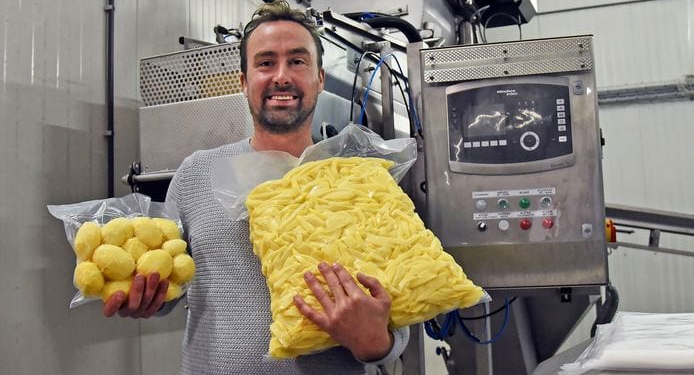In the warehouse, 37-year-old Marijn Uitdewilligen shows his own chip line. With a candlestick, the fries of the ras Agria end up on the band. They go to a ‘detonater’ who sends the pagers up with a spiral so that iniquities are left downstairs. Once upstairs, all you see is pure potatoes. They then make a journey through the peeling machine, a water bath, a reading tape to remove the less beautiful potatoes and then they are allowed to bathe again.
Vacuum bag
At the end, the farmer from the Zeeland town of Sint Kruis (near the border with Belgium) can choose: to preserve the whole peeled potato or send it through the cutter to pour into a vacuum bag as sliced fries. I keep them under water all the time so they don’t discolour. I’m not adding anything else. The customer has to pre-bake them for a few minutes at 140 degrees. Then he can bake them off.”
Farmers are not used to selling their own cropsMarijn Uitdewilligen, Farmer and chicken farmer
Marijn grows 50 hectares of potatoes every season, mainly for the french fries industry. Not contract cultivation, but intended for the free market. Nevertheless, the free marketing of its 2500 tonnes of potatoes also has risks. ,,Because it is always a bit of gambling when you can get a good price for your potatoes. The last week of August I had to sell some of my Agria’s from the previous harvest as fodder. You’ll get 2 cents a kilo for that. That’s 10 cents below the cost!”
More topping on the sandwich
He thought it would be different at the end of last year. The idea for fresh fries from our own farm was already on the table. I want to add value. Then you can process potatoes yourself into fries or peeled potatoes. That’ll give you a little more topping on the sandwich. I am now slightly less dependent on the total chain – from farmer to plate. I’m partly in control of the sales myself. It is quite a step, because farmers are not used to selling their own crops themselves. They all usually go into trade.”
Investment
The grower from Sint Kruis was able to take over a production line from a colleague in Limburg. An investment of tens of thousands of euros. The spring lockdown was a great opportunity to test. There was hardly any demand for potato fries at the time. Since the end of August I have been eating about 1000 kilos of fries a week. I have a big cold store in which the potatoes stay good for a long time. So I can deliver all year round. I want to gradually grow to 2500 kilos of fries per week.”
Refrigerated transport
The farm fries under the name Pommes Appétit already find its way to customers in Zeeuws-Vlaanderen and also partly across the Belgian border. These are mostly restaurants and farm shops. To deliver the wherever fresh as possible, Marijn has purchased a van with cooling. Delivering directly to customers in the area gives him satisfaction, but is also sustainable, he stresses. In terms of C02 emissions, it is much better than transporting the potatoes to a factory in the east of the country and then driving them back to Zeeland as fries. Such a short chain as I have now set up, I feel better as a producer who also works on sustainability. Moreover, it is a beautiful product. An Agria potato gives beautiful golden fries.”







